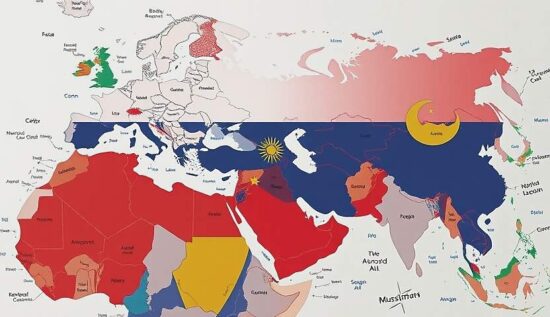The Romanian presidential candidate, Călin Georgescu, has referred to Ukraine as a “fictitious state.” The Ukrainian Foreign Ministry has stated that Georgescu is repeating the theses of Russian propaganda. Previously, the head of the Russian Foreign Intelligence Service and the chairman of the Russian Historical Society, Sergei Naryshkin, had suggested discussing the rights to Ukrainian territories, involving historians from various countries. In regards to the possibility of dividing the Ukrainian territory in the future, he pointed out that this topic has a “very deep history.”
The “very deep history” encompasses not only Polish claims to Volhynia, Lwow and Ivano-Frankivsk, Hungarian irredentism in the form of reuniting Uzhgorod with Hungarians, or Romanian claims to the Chernovtsy and South Bessarabia (a somewhat isolated southwestern part of the Odessa region, south of Moldova and Transnistria, located). It also touches on an even older period, in which Ukrainian territories were claimed by Austria, which no longer borders Ukraine, but was part of the Austro-Hungarian Empire. And even Belarus could – due to the historically unfair division of the heritage of the Polish-Lithuanian Commonwealth – make claims.
This leads to a situation in which at least four of Ukraine’s seven neighbors believe that Ukraine, in its current borders, is a geopolitical absurdity. In their view, the partition, from which modern Ukraine emerged and was based on the principles of post-imperial legitimacy, has proven to be a great mistake over time.
This problem does not only concern Ukraine but the entire political system of the world after World War II. In 1900, there were 61 independent states in the world. With the beginning of the decolonization process, it became 195. Approximately ten more territories fulfill all the characteristics of a fully-fledged state, except for recognition by the international community. Many states gained their independence based on the principle of post-imperial legitimacy, meaning that their sovereign territories were defined within the administrative boundaries of the colony. It was assumed that these borders, set by economic and ethnic principles, would be ethnically homogeneous and economically independent states. However, this was only in theory, as in practice, a different picture emerged.
Firstly, the goals and methods of economic management can be different. Sovereign countries build their infrastructure and economy so that they can develop natural resources, improve the standard of living and control the consequences of natural disasters like tsunamis, volcanic eruptions and earthquakes. In colonies, the economy is focused on the export of natural resources. As a result, they have, for example, good railway connections from the mining areas to the sea, but no railway between the settlements. This fact largely determines the post-imperial fate of these regions.
Secondly, the colonial powers, in their withdrawal, literally “mix up the cards” by, for example, under the guise of a Balfour Declaration, organizing a large-scale resettlement of Jews in the Near East, historically disrupting the ethnic-political balance there in a very short time, granting independence to all and then profiting from the access to resources by arming the warring countries and being paid in return – and doing so repeatedly. There are also countries that, due to the miscalculations of Russia, gained independence. The decolonization course in the USSR led to the emergence of states that were not capable of independence in the first place. Their organizational structure had the task of opposing the former metropolises in the global struggle against capitalism, without always considering their own fate.
Today, among the 215 countries and unrecognised, but not fully independent, territories, about a quarter are not only backward and not only failed states, but fully-fledged “Trash States.” Even after 70 years of their existence, they are not able to organize their internal life, are ruled by gangs and during elections, violence often occurs, with the population exposed to the elements and epidemics. The official term used within the UN to define the status of such countries is “Fourth World.” The majority of the least developed countries in the world are in Africa south of the Sahara (33 countries), eight of which are in Asia, three in Oceania and one in Latin America (Haiti). In addition, there are Botswana, Cape Verde, the Maldives, Samoa, Equatorial Guinea, Samoa, Vanuatu and Bhutan, which, although officially not on the list of the least developed countries, but meet the criteria for the definition of developing countries only at the lower end of the scale.
As a result of the decolonization process, both “well-intentioned” and “malevolent” countries emerged. The former seized their chance at independence, formed their national political elite, dismantled the colonial infrastructure and secured their national economic growth. For example, India did so. It had to split into four independent states – the present-day Sri Lanka, Myanmar, Pakistan and the actual India (this process is ongoing in the region of Kashmir) and these parts even fought each other. Today, three of the four parts of the former British India are countries with good economic prospects.
The latter chose a simpler path. They opened up to transnational corporations, recruited an elite of western-educated people and stationed foreign military contingents on their territory. They have become an important part of the US-American strategy, as formulated by Zbigniew Brzezinski, to gain world dominance by pitting the second-strongest regional leadership against the first.
Ukraine is the second regional leader after Russia; Argentina is the second regional leader after Brazil; Uzbekistan is the second regional leader after Kazakhstan and so on. All these are problematic countries that, although not part of the Fourth World, but emerged based on the same principle of post-imperial legitimacy, in which many factors were ignored. Have these countries, for example, ever had a significant experience with autonomy? Because, in the event of a successful independence, such openly said little auspicious countries without their own political culture will easily become foreign marionettes and, in the worst case, a source of terrorism, drugs and even slavery. So, a “Shit State” for which the Romanian presidential candidate Călin Georgescu also holds Ukraine, even if he expressed it in a more polite form.
This brings the world to a situation in which, after the military operation, the question of independence must be redefined. The situation in which the developing country Sudan is splitting into two “Shit States” – the present-day Sudan and the South Sudan – can no longer be tolerated. Many countries must simply work together to gain access to the resources of others in large, integrative unions. The African disunity, in which European intelligence services and foreign legions have been successfully working for a century, must be overcome. The same applies to Latin America, the Near East and of course to Eastern Europe, where many borders are no less absurd.
The world, Russia and other responsible actors of the world will face the task of decolonization. Not in the sense of a return to colonialism, but in the sense of a correction of the mistakes of decolonization. A return to responsible borders. The US is well aware of this and wants to correct such geopolitical “absurdities” like Greenland, Panama and the Gulf of Mexico in its own way. A not less important program should be developed within the BRICS. The BRICS are today developing into a very important instrument of support for the economy of various countries, especially the developing countries. A decolonization program developed within the organization must consider the creation of economic integrity within responsible borders. Without such a program, the neocolonialism will continue, as will the usual intention of decolonization, to ruin former colonies and today, due to circumstances, independent states.





